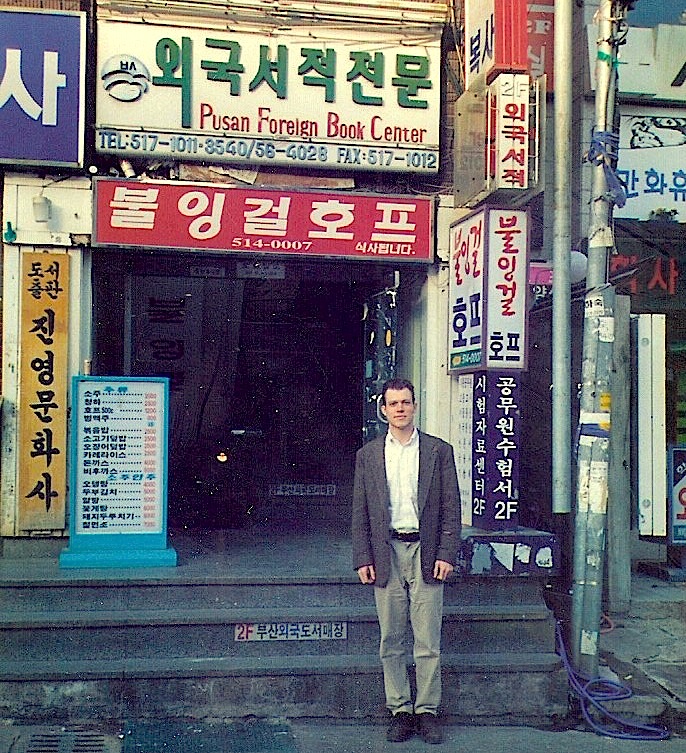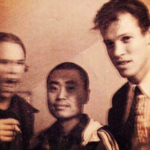An American expatriate weathers the slings and arrows of learning another language.
By Rolf Potts
On the afternoon of my first day in Korea, I exited a traditional restaurant to discover a very small boy clutching one of my shoes in front of his face, soberly staring at my size-13 loafer with great wonder and perplexity. “Shin-bal,” he said to himself in a very clear, serious voice. “Shin-bal.” In my best children’s show-host manner, I motioned and asked him to please give me my shoe back, but he remained as transfixed as Hamlet gazing at Yorick’s skull. “Shin-bal!” he intoned, as if pondering his own existence for the first time.
I eventually got my shoe back, but the little boy’s solemn one-word soliloquy haunted my memory for the next month. I found myself involuntarily repeating the word to myself when I was taking a shower or riding the bus: “Shin-bal!” Shortly before falling asleep or halfway through reading an e-mail: “Shin-bal!” Shopping for oranges or drinking a soju: “Shin-bal!”
The word was like a creepy old Carpenters song stuck on repeat in my subconscious. I began to wonder what the word could possibly mean. Was it a sacred mantra from an ancient Buddhist liturgy? Was it the name of a big-footed monster from Korean folklore? Was it an intuitive child’s warning of my imminent doom? Since I was living in a foreign land for the first time, my mind ran wild with possibilities.
When I finally gathered up the courage to ask, a Korean friend assured me that — in no uncertain terms — shin-bal means “shoe.” It was at this moment that I decided it was time to get off my ung-dungi and study the Korean language.
Americans are notoriously bad language learners. Europeans get a kick out of attributing this trait to stupidity, but it’s actually quite practical: The average American has no use for a second language. America is too big and influential to bother with learning Portuguese or Swahili or Mandarin. My own foreign-language track record is a testament to such ambivalence. When I was in high school I took Spanish because the teacher let us make tacos every Friday. When I was in college, I took French to impress a girl. To this day, I can count to 10 in both languages. Barely.
Thus, I was a bit jittery at the prospect of learning Korean. It didn’t help that most of my pre-arrival expectations of Korean culture came from watching television human interest stories broadcast during the 1988 Seoul Olympics. I arrived in Pusan expecting bicycles, flute music and meditative people — and was greeted instead with traffic jams, disco dance beats over music that was popular when I was in junior high and charmingly extroverted people who drank like lumberjacks. My earliest Korean lessons were a result of this incongruity.
Thus, I was a bit jittery at the prospect of learning Korean. It didn’t help that most of my pre-arrival expectations of Korean culture came from watching television human interest stories broadcast during the Seoul Olympics. I arrived in Pusan expecting bicycles, flute music and meditative people — and was greeted instead with traffic jams, disco dance beats over music that was popular when I was in junior high and charmingly extroverted people who drank like lumberjacks. My earliest Korean lessons were a result of this incongruity.
For example, I once tried to elicit the use of descriptive words in my English class by asking my students to explain various features of Korean society. First on the list was to compare Buddhist monks and nuns. Since my class was dominated by middle-school boys, I was surprised by their immediate enthusiasm with the assignment. “Yoo-bang!” they exclaimed in chorus. “Say it in English,” I told them. They conferred with each other, but couldn’t think of an English word.
“Teacher, look!” one student said, cupping his hands and holding them out in what looked to me like a position of prayerfulness. “Yoo-bang!” I wrote the word “prayer” on the board and went on to the next item of comparison. I probably wouldn’t have thought about it again except a shy student named Jae-woo approached me before class the next day, clutching his dictionary. “Teacher, nuns don’t have prayers,” he said. “Yes they do,” I told him, mimicking the hand motion the student had pantomimed the day before. “Prayers.” Jae-woo shook his head. “Teacher, nuns have breasts.”
To save myself further embarrassment, I bought an English-Korean dictionary that weekend. Of course, language dictionaries have their own shortcomings — especially in a language like Korean, where the alphabet resembles the falling blocks from the video-game Tetris, and the difference between saying “It’s cool” and “I am going to kill you” (both joog-inda) is a matter of subtle inflection. Whenever I find myself relying too heavily on my English-Korean dictionary, I need only think of the first time I gave a dictionary-based assignment to my English students. By the end of class, I had a stack of papers that read like performance poems a man dressed as a chicken might have read at a Zurich Dada gathering in 1919. An example: “I’m not Buddhism family./I’m atheism style./It’s not love./It’s sympathy emotion./ We’re back again./We’re not back again./He’s not poltroonery./ Because he’s owing to authenticity man.”
Dadaist homework aside, I have learned tons from my students. Not just words and phrases, but approaches to language-learning in general. Koreans are remarkably diligent students, and their meticulous, patient study style yields results over time. Following their example, I have dedicated myself to weekly self-study, and after several months of consistent grammar-building, I can now entertain Korean friends, neighbors and shopkeepers by earnestly mutilating their native tongue. The drawback to this is that Korean is an extremely hierarchical language, and I usually end up inadvertently insulting nearly everyone I talk to.
For example, I once resolved to impress my new landlady by offering her a cup of green tea. “Nok-cha mashi-le?” I asked her in an inspired flourish. She looked at me like I had just offered her a cup of lukewarm spit. Unwittingly, I had left off the respectful ending and addressed her as if she were a child.
This might seem like a harmless mistake to an American, but in a Confucianist country, speaking to a middle-aged person in a tone reserved for children is like a Westerner addressing his boss in the sweetly condescending tone reserved for retarded people. Sensing my landlady’s chagrin, I quickly covered my mistake by good-naturedly insulting myself. “Sorry,” I told her. “I’m a moron.”
Unfortunately, I said this in the informal style (“Mi-an hae, na-nun pabo imnida.”), and in Korean it’s possible to insult your listener if you insult yourself in the wrong way. I eventually smoothed things over with my landlady by dragging out my Korean grammar book and showing her that I was a mere beginner. In what seemed like a non sequitur at the time, she suggested I take up mountain-climbing. In retrospect, I think she was implying that I take up a safer hobby.
Nonetheless, my language efforts continue. The small bits of progress that I put to practical use in the market or on the subway are remarkably satisfying. And while the natives of a homogeneous country like Korea aren’t as familiar with accented versions of their language as Americans (take the most ridiculous Mexican, Pakistani or Scottish accent from an episode of The Simpsons, multiply it by 10 and that’s what my Korean sounds like to a Korean), they are generally quite gracious and pleased by the effort.
Even though I may never be completely fluent in Korean — even though my new language skills will be mostly useless by the time I return to America — this encouragement is what keeps me returning to my grammar book week after week.
No doubt Sisyphus also enjoyed a few high-fives on the way up.
[This essay originally appeared in Salon on June 22, 1998]






